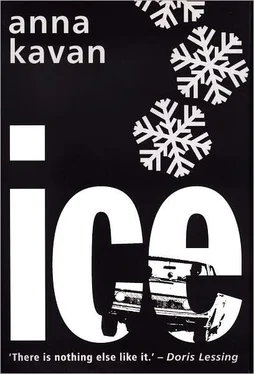I had been infatuated with her at one time, had intended to marry her. Ironically, my aim then had been to shield her from the callousness of the world, which her timidity and fragility seemed to invite. She was over-sensitive, highly- strung, afraid of people and life; her personality had been damaged by a sadistic mother who kept her in a permanent state of frightened subjection. The first thing I had to do was to win her trust, so I was always gentle with her, careful to restrain my feelings. She was so thin that, when we danced, I was afraid of hurting her if I held her tightly. Her prominent bones seemed brittle, the protruding wrist-bones had a particular fascination for me. Her hair was astonishing, silver-white, an albino’s, sparkling like moonlight, like moonlit Venetian glass. I treated her like a glass girl; at times she hardly seemed real. By degrees she lost her fear of me, showed a childish affection, but remained shy and elusive. I thought I had proved to her that I could be trusted, and was content to wait. She seemed on the point of accepting me, though immaturity made it hard to assess the sincerity of her feelings. Her affection perhaps was not altogether pretence, although she deserted me suddenly for the man to whom she was now married.
This was past history. But the consequences of the traumatic experience were still evident in the insomnia and headaches from which I suffered. The drugs prescribed for me produced horrible dreams, in which she always appeared as a helpless victim, her fragile body broken and bruised. These dreams were not confined to sleep only, and a deplorable side effect was the way I had come to enjoy them.
Visibility had improved, the night was no less dark, but the snow had stopped. I could see the remains of a fort on the top of a steep hill. Nothing much was left of it but the tower, it had been gutted, empty window-holes showed like black open mouths. The place seemed vaguely familiar, a distortion of something I half-remembered. I seemed to recognize it, thought I had seen it before, but could not be certain, as I had only been here in the summer, when everything looked quite different.
At that time, when I accepted the man’s invitation, I suspected him of an ulterior motive in asking me. He was a painter, not serious, a dilettante; one of those people who always have plenty of money without appearing to do any work. Possibly he had a private income: but I suspected him of being something other than what he seemed. The warmth of my reception surprised me, he could not have been more friendly. All the same, I was on my guard.
The girl hardly spoke, stood beside him, glancing sideways at me with big eyes through her long lashes. Her presence affected me strongly, though I scarcely knew in what way. I found it difficult to talk to the two of them. The house was in the middle of a beech wood, so closely surrounded by many tall trees that we seemed to be actually in the tree tops, waves of dense green foliage breaking outside every window. I thought of an almost extinct race of large singing lemurs known as the Indris, living in the forest trees of a remote tropical island. The gentle affectionate ways and strange melodious voices of these near-legendary creatures had made a great impression on me, and I began speaking about them, forgetting myself in the fascination of the subject. He appeared interested. She said nothing, and presently left us to see about lunch. The conversation at once became easier when she had gone.
It was midsummer, the weather was very hot, the rustling leaves just outside made a pleasant cool sound. The man’s friendliness continued. I seemed to have misjudged him, and began to be embarrassed by my suspicions. He told me he was glad I had come, and went on to speak of the girl. ‘She’s terribly shy and nervous, it does her good to see someone from the outside world. She’s too much alone here.’ I couldn’t help wondering how much he knew about me, what she had told him. To remain on the defensive seemed rather absurd; still, there was some reservation in my response to his amiable talk.
I stayed with them for a few days. She kept out of my way. I never saw her unless he was there too. The fine hot weather went on. She wore short, thin, very simple dresses that left her shoulders and arms bare, no stockings, a child’s sandals. In the sunshine her hair dazzled. I knew I would not be able to forget how she looked. I noted a marked change in her, a much increased confidence. She smiled more often, and once in the garden I heard her singing. When the man called her name she came running. It was the first time I had seen her happy. Only when she spoke to me she still showed some constraint. Towards the end of my visit he asked whether I had talked to her alone. I told him I had not. He said: ‘Do have a word with her before you go. She worries about the past; she’s afraid she made you unhappy.’ So he knew. She must have told him all there was to tell. It was not much, certainly. But I would not discuss what had happened with him and said something evasive. Tactfully, he changed the subject: but returned to it later on. ‘I wish you would set her mind at rest. I shall make an opportunity for you to speak to her privately.’ I did not see how he was going to do this, as the next day was the last I would spend with them. I was leaving in the late afternoon.
That morning was the hottest there had been. Thunder was in the air. Even at breakfast time the heat was oppressive. To my surprise, they proposed an outing. I was not to leave without having seen one of the local beauty spots. A hill was mentioned, from which there was a celebrated view: I had heard the name. When I referred to my departure I was told it was only a short drive, and that we should be back in plenty of time for me to pack my bag. I saw that they were determined on the arrangement, and agreed.
We took a picnic lunch to eat near the ruins of an old fort, dating from a remote period when there had been fear of invasion. The road ended deep in the woods. We left the car and continued on foot. In the steadily increasing heat, I refused to hurry, dropped behind, and when I saw the end of the trees, sat down in the shade. He came back, pulled me to my feet. ‘Come along! You’ll see that it’s worth the climb.’ His enthusiasm urged me up a steep sunny slope to the summit, where I duly admired the view. Still unsatisfied, he insisted that I must see it from the top of the ruin. He seemed in a queer state, excitable, almost feverish. In the dusty dark, I followed him up steps cut inside the tower wall, his massive figure blocking out the light so that I could see nothing and might have broken my neck where a step was missing. There was no parapet at the top, we stood among heaps of rubble, nothing between us and the drop to the ground, while he swung his arm, pointing out different items in the extensive view. ‘This tower has been a landmark for centuries. You can see the whole range of hills from here. The sea’s over there. That’s the cathedral spire. The blue line beyond is the estuary.’
I was more interested in closer details: piles of stones, coils of wire, concrete blocks, and other materials for dealing with the coming emergency. Hoping to see something that would provide a clue to the nature of the expected crisis, I went nearer the edge, looked down at the unprotected drop at my feet.
‘Take care!’ he warned, laughing. ‘You could easily slip here, or lose your balance. The perfect spot for a murder, I always think.’ His laugh sounded so peculiar that I turned to look at him. He came up to me, saying: ‘Suppose I give you a little push … like this—’ I stepped back just in time, but missed my footing and stumbled, staggering on to a crumbling, precarious ledge lower down. His laughing face hung over me, black against the hot sky. ‘The fall would have been an accident, wouldn’t it? No witnesses. Only my word for what happened. Look how unsteady you are on your feet. Heights seem to affect you.’ When we got down to the bottom again I was sweating, my clothes were covered in dust.
Читать дальше












